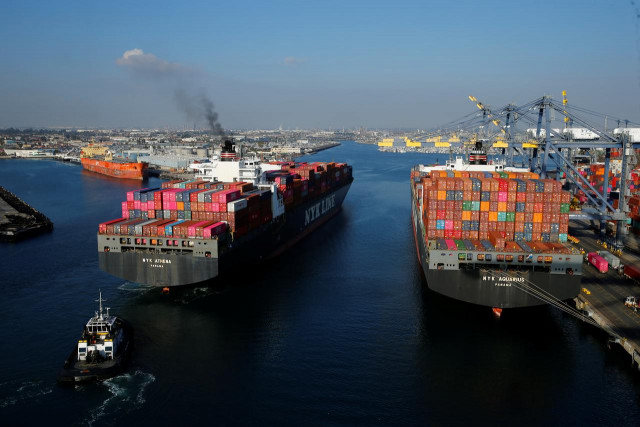PTI govt crafts strategy to stop smuggling
Announces anti-smuggling and border management measures

PHOTO: REUTERS
The decisions were taken by Prime Minister Imran Khan in a meeting that was attended by officials from the Ministry of Interior, Ministry of Commerce and Federal Board of Revenue. The lead role to curb the smuggling was given to the Customs Department. It was also decided, in principle, that about 2,000 people will be recruited to strengthen the Customs human resources.
“The government has also approved the National Anti-Smuggling strategy,” said Dr Firdous Ashiq Awan, Special Assistant to the Prime Minister on Information, while addressing a news conference after the meeting. It was for the first time that a national strategy has been approved to curb smuggling.
The special assistant said: “The meeting was informed that the annual quantum of smuggling was $6.9 billion (Rs1 trillion). The huge size of smuggling was causing $3.4 billion (Rs550 billion) losses in revenues.”
A customs border management strategy has also been approved for the first time to effectively plug smuggling, promote industrialisation for exports’ enhancement.
The meeting was informed that the lack of human resources, logistics, weak prosecutions and limited monitoring of smuggling activities were the key reasons behind smuggling in Pakistan. The high customs tariffs, low cost of smuggling and reverse transit trade goods were also causing smuggling in the country.
Despite limited resources, the Customs seized Rs31.1 billion worth of goods in the previous fiscal year, higher than the preceding year. The department also seized Rs489 million worth of smuggled currency, the PM was informed.
Curbing cash smuggling by the couriers was one of the deficient areas pointed out by both the Asia Pacific Group on Money Laundering and the Financial Action Task Force.
A few months ago, FBR Chairman Shabbar Zaidi had also sought the support of Chief of Army Staff General Qamar Bajwa to curb smuggling at borders. Zaidi had also tasked his machinery to inspect smuggled goods at key commercial markets of the country.
At present, the total strength of the Customs Department is 9,514 and it got an Rs8 billion budget. The scarcity of manpower can be gauged from the fact that there is only one person to man 1,100 square kilometres area in Balochistan.
The officials said that the PM agreed, in principle, to recruit 2,000 people to improve border management and curb smuggling. The estimated annual impact of the additional workforce will be around Rs700 million initially.
It was also decided in the meeting to set up economic development zones in the border areas to provide legal sources of income to the people, living in “neglected areas”. The plan includes local and international border markets in areas of Balochistan, bordering Afghanistan.
Such international markets will be built once the Pakistan-Afghan border is fully-fenced and there is complete control over inward and outward movement of cargos and people.
The sources said that the army chief was keen to create job opportunities in the border areas as an incentive to shift away from the illegal activities.
Earlier, this week, the FBR said that it was making efforts towards trade facilitation in Balochistan and a senior BS-21 officer of Pakistan Customs Service has been specifically posted as a chief collector with dedicated Collectorates for Enforcement and Appraisement.
The Model Customs Collectorate (Preventive), Quetta was established to curb smuggling. Dedicated anti-smuggling units have been set-up with the available manpower and logistics and tasked to man the long and porous Pakistan-Afghan border.
The FBR has also established Model Customs Collectorate, Appraisement Quetta to facilitate trade and to expedite customs clearances from dry port and customs border stations in Balochistan.
The board further said that it has posted adequate staff in the far-flung customs stations of Taftan, Panjgur and Chaman border in order to ensure immediate clearance of goods especially perishable items like dry/fresh fruits and vegetables and to ensure clearances through the WeBOC-Glo automated system.
However, still the staff is able to control flows of goods only at the dedicated routes and it does not have any control over the rest of the borders. Because of a shortage of manpower, the anti-smuggling powers have also been given to the Coast Guards and the Frontier Constabulary but such forces are also not able to curb the smuggling.


1724319076-0/Untitled-design-(5)1724319076-0-208x130.webp)
















COMMENTS
Comments are moderated and generally will be posted if they are on-topic and not abusive.
For more information, please see our Comments FAQ